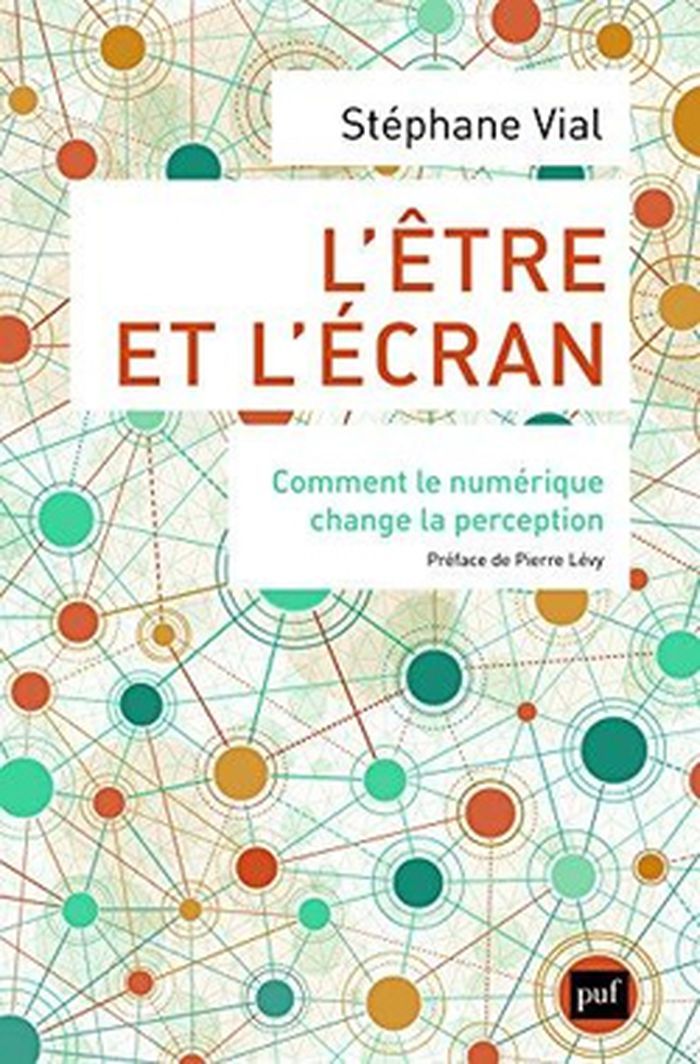L'être et l'écran
$37.95
(available to order)
Summary:
Les techniques ne sont pas seulement des outils, ce sont des structures de la perception. Elles conditionnent la manière dont le monde nous apparaît et dont les phénomènes nous sont donnés. Depuis près d’un demi-siècle, les technologies numériques nous apportent des perceptions d’un monde inconnu. Ces êtres qui émergent de nos écrans et de nos interfaces bouleversent(...)
L'être et l'écran
Actions:
Price:
$37.95
(available to order)
Summary:
Les techniques ne sont pas seulement des outils, ce sont des structures de la perception. Elles conditionnent la manière dont le monde nous apparaît et dont les phénomènes nous sont donnés. Depuis près d’un demi-siècle, les technologies numériques nous apportent des perceptions d’un monde inconnu. Ces êtres qui émergent de nos écrans et de nos interfaces bouleversent l’idée que nous nous faisons de ce qui est réel et nous réapprennent à percevoir. Quel est l’être des êtres numériques ? Que devient notre être-dans-le-monde à l’heure des êtres numériques ? Le temps est venu d’analyser l’«ontophanie numérique» dans toute sa complexité. La prétendue différence entre le réel et le virtuel n’existe pas et n’a jamais existé. Nous vivons dans un environnement hybride, à la fois numérique et non numérique, en ligne et hors ligne, qu’il appartient aux designers de rendre habitable. -
Archive, library and the digital
$48.00
(available to order)
Summary:
Is there a cultural logic of what we have come to call the information age? Have the technologies and techniques centered on the computer provided not only tools but also the metaphors through which we now understand the social and economic formation of our world? In Control, Seb Franklin addresses the conditions of knowledge that make the concept of the "information(...)
Control: digitality as cultural logic
Actions:
Price:
$48.00
(available to order)
Summary:
Is there a cultural logic of what we have come to call the information age? Have the technologies and techniques centered on the computer provided not only tools but also the metaphors through which we now understand the social and economic formation of our world? In Control, Seb Franklin addresses the conditions of knowledge that make the concept of the "information economy" possible while at the same time obscuring its effects on material social spaces. In so doing, Franklin traces three intertwined threads: the relationships among information, labor, and social management that emerged in the nineteenth century; the mid-twentieth-century diffusion of computational metaphors; and the appearance of informatic principles in certain contemporary socioeconomic and cultural practices. Drawing on critical theory, media theory, and the history of science, Franklin names control as the episteme grounding late capitalism. Beyond any specific device or set of technically mediated practices, digitality functions within this episteme as the logical basis for reshaped concepts of labor, subjectivity, and collectivity, as well as for the intensification of older modes of exclusion and dispossession. In tracking the pervasiveness of this logical mode into the present, Franklin locates the cultural traces of control across a diverse body of objects and practices, from cybernetics to economic theory and management styles, and from concepts of language and subjectivity to literary texts, films, and video games.
Archive, library and the digital
Digital keywords
$31.95
(available to order)
Summary:
In the age of search, keywords increasingly organize research, teaching, and even thought itself. Inspired by Raymond Williams's 1976 classic 'Keywords', the timely collection 'Digital Keywords' gathers pointed, provocative short essays on more than two dozen keywords by leading and rising digital media scholars from the areas of anthropology, digital humanities, history,(...)
Digital keywords
Actions:
Price:
$31.95
(available to order)
Summary:
In the age of search, keywords increasingly organize research, teaching, and even thought itself. Inspired by Raymond Williams's 1976 classic 'Keywords', the timely collection 'Digital Keywords' gathers pointed, provocative short essays on more than two dozen keywords by leading and rising digital media scholars from the areas of anthropology, digital humanities, history, political science, philosophy, religious studies, rhetoric, science and technology studies, and sociology. 'Digital Keywords' examines and critiques the rich lexicon animating the emerging field of digital studies.
Archive, library and the digital
books
$32.95
(available in store)
Summary:
Earth Moves, Bernard Cache's first major work, conceptualizes a series of architectural images as vehicles for two important developments. First, he offers a new understanding of the architectural image itself. Following Gilles Deleuze and Henri Bergson, he develops an account of the image that is nonrepresentational and constructive—images as constituents of a primary,(...)
Earth moves: the furnishing of territories
Actions:
Price:
$32.95
(available in store)
Summary:
Earth Moves, Bernard Cache's first major work, conceptualizes a series of architectural images as vehicles for two important developments. First, he offers a new understanding of the architectural image itself. Following Gilles Deleuze and Henri Bergson, he develops an account of the image that is nonrepresentational and constructive—images as constituents of a primary, image world, of which subjectivity itself is a special kind of image. Second, Cache redefines architecture beyond building proper to include cinematic, pictoral, and other framings. Complementary to this classification, Cache offers what is to date the only Deleuzean architectural development of the "fold," a form and concept that has become important over the last few years. For Cache, as for Deleuze, what is significant about the fold is that it provides a way to rethink the relationship between interior and exterior, between past and present, and between architecture and the urban.
books
January 1995
Archive, library and the digital
$32.95
(available to order)
Summary:
Uniting eighteen leading critics in early modern literary studies, this volume explores book history and the material text. The essays incorporate a broad range of subjects, such as gender and sexuality, religion, postcolonial theory, political and economic history, adaptation and appropriation, historical formalism, and digital humanities. With essays on Shakespeare,(...)
Archive, library and the digital
August 2016
The book in history, the book as history
Actions:
Price:
$32.95
(available to order)
Summary:
Uniting eighteen leading critics in early modern literary studies, this volume explores book history and the material text. The essays incorporate a broad range of subjects, such as gender and sexuality, religion, postcolonial theory, political and economic history, adaptation and appropriation, historical formalism, and digital humanities. With essays on Shakespeare, Spenser, Milton, and others, this volume makes early modern literary studies and book history accessible and will be a core resource in the field for years to come.
Archive, library and the digital
$42.00
(available to order)
Summary:
David Parisi offers the first full history of haptic interface technologies, showing how the efforts of scientists and engineers over the past 300 years have gradually remade and redefined our sense of touch. Through lively analyses of electrical machines, videogames, sex toys, sensory substitution systems, robotics, and human-computer interfaces, Parisi shows how the(...)
Archaeologies of touch: interfacing with haptics from electricity to computing
Actions:
Price:
$42.00
(available to order)
Summary:
David Parisi offers the first full history of haptic interface technologies, showing how the efforts of scientists and engineers over the past 300 years have gradually remade and redefined our sense of touch. Through lively analyses of electrical machines, videogames, sex toys, sensory substitution systems, robotics, and human-computer interfaces, Parisi shows how the materiality of touch technologies has been shaped by attempts to transform human into more efficient processors of information.
Archive, library and the digital
Espaces de savoir
$25.00
(available in store)
Summary:
Dans le paradigme de complexité qui est le nôtre, les contextes institutionnels dans lesquels s'exerce le savoir doivent dorénavant ouvrir sur un environnement général qui le réclame, dans l'idée d'un continuum devenu nécessaire entre les situations humaines et le savoir. C'est à cette problématique contemporaine que le présent ouvrage réfléchit. Il résulte de trois(...)
Espaces de savoir
Actions:
Price:
$25.00
(available in store)
Summary:
Dans le paradigme de complexité qui est le nôtre, les contextes institutionnels dans lesquels s'exerce le savoir doivent dorénavant ouvrir sur un environnement général qui le réclame, dans l'idée d'un continuum devenu nécessaire entre les situations humaines et le savoir. C'est à cette problématique contemporaine que le présent ouvrage réfléchit. Il résulte de trois années de travail dans le cadre d'un projet réunissant cinq contributeurs de quatre universités québécoises ainsi qu'une artiste du milieu littéraire. L'équipe s'est intéressée à faire émerger et à développer des stratégies de spatialisation permettant d'accéder de manière inédite à des environnements de savoir ainsi qu'à générer et à organiser de manière singulière de tels environnements. Il s'agit ici d'ouvrir un champ de recherche artistique sur la question de la spatialisation du savoir, dans le cadre des mises en situation individuelles et créatives dont l'efficacité et la validité répondent ainsi à des impératifs très différents de ceux commandés par des critères de multitude et d'universalité.
$23.50
(available to order)
Summary:
“The revolution will be Twittered!” declared journalist Andrew Sullivan after protests erupted in Iran. But as journalist and social commentator Evgeny Morozov argues in The Net Delusion, the Internet is a tool that both revolutionaries and authoritarian governments can use. For all of the talk in the West about the power of the Internet to democratize societies, regimes(...)
The net delusion: the dark side of the internet
Actions:
Price:
$23.50
(available to order)
Summary:
“The revolution will be Twittered!” declared journalist Andrew Sullivan after protests erupted in Iran. But as journalist and social commentator Evgeny Morozov argues in The Net Delusion, the Internet is a tool that both revolutionaries and authoritarian governments can use. For all of the talk in the West about the power of the Internet to democratize societies, regimes in Iran and China are as stable and repressive as ever. Social media sites have been used there to entrench dictators and threaten dissidents, making it harder—not easier—to promote democracy. Marshalling a compelling set of case studies, The Net Delusion shows why the cyber-utopian stance that the Internet is inherently liberating is wrong, and how ambitious and seemingly noble initiatives like the promotion of “Internet freedom” are misguided and, on occasion, harmful.
Archive, library and the digital
The digital condition
$27.95
(available to order)
Summary:
Our daily lives, our culture, and our politics are now shaped by the digital condition, in which greater numbers of people are engaged in negotiating meaning in ever more dimensions of life, from the trivial to the profound. They are making use of a complex communication infrastructure, currently dominated by social mass media such as Twitter and Facebook, on which they(...)
The digital condition
Actions:
Price:
$27.95
(available to order)
Summary:
Our daily lives, our culture, and our politics are now shaped by the digital condition, in which greater numbers of people are engaged in negotiating meaning in ever more dimensions of life, from the trivial to the profound. They are making use of a complex communication infrastructure, currently dominated by social mass media such as Twitter and Facebook, on which they have come to depend.Amidst a confusing plurality, Felix Stalder argues that there are three key constituents of this condition: the use of existing cultural materials for one’s own production, the way in which new meaning is established as a collective endeavor, and the underlying role of algorithms and automated decision-making processes that give shape to massive volumes of data. These three characteristics define what Stalder calls “the digital condition.”
Archive, library and the digital
Being material
$55.95
(available to order)
Summary:
In 'Being Material', artists and technologists explore the relationship of the digital to the material, demonstrating that processes that seem wholly immaterial function within material constraints. Digital technologies themselves, they remind us, are material things—constituted by atoms of gold, silver, silicon, copper, tin, tungsten, and more.
Archive, library and the digital
October 2019
Being material
Actions:
Price:
$55.95
(available to order)
Summary:
In 'Being Material', artists and technologists explore the relationship of the digital to the material, demonstrating that processes that seem wholly immaterial function within material constraints. Digital technologies themselves, they remind us, are material things—constituted by atoms of gold, silver, silicon, copper, tin, tungsten, and more.
Archive, library and the digital








